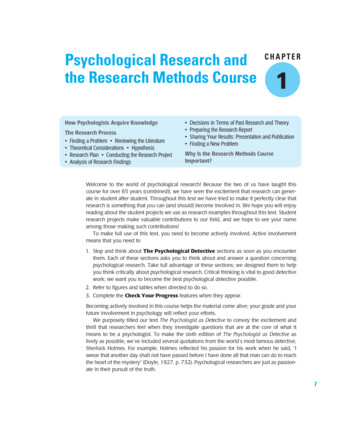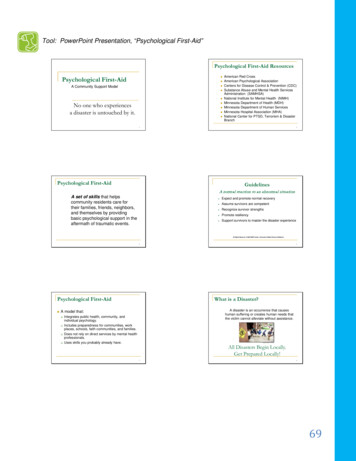
Transcription
Psychological Research andthe Research Methods CourseHow Psychologists Acquire KnowledgeThe Research Process Finding a Problem Reviewing the Literature Theoretical Considerations Hypothesis Research Plan Conducting the Research Project Analysis of Research Findings CHAPTER1Decisions in Terms of Past Research and TheoryPreparing the Research ReportSharing Your Results: Presentation and PublicationFinding a New ProblemWhy Is the Research Methods CourseImportant?Welcome to the world of psychological research! Because the two of us have taught thiscourse for over 65 years (combined!), we have seen the excitement that research can generate in student after student. Throughout this text we have tried to make it perfectly clear thatresearch is something that you can (and should) become involved in. We hope you will enjoyreading about the student projects we use as research examples throughout this text. Studentresearch projects make valuable contributions to our field, and we hope to see your nameamong those making such contributions!To make full use of this text, you need to become actively involved. Active involvementmeans that you need to1. Stop and think about The Psychological Detective sections as soon as you encounterthem. Each of these sections asks you to think about and answer a question concerningpsychological research. Take full advantage of these sections; we designed them to helpyou think critically about psychological research. Critical thinking is vital to good detectivework; we want you to become the best psychological detective possible.2. Refer to figures and tables when directed to do so.3. Complete the Check Your Progress features when they appear.Becoming actively involved in this course helps the material come alive; your grade and yourfuture involvement in psychology will reflect your efforts.We purposely titled our text The Psychologist as Detective to convey the excitement andthrill that researchers feel when they investigate questions that are at the core of what itmeans to be a psychologist. To make the sixth edition of The Psychologist as Detective aslively as possible, we’ve included several quotations from the world’s most famous detective,Sherlock Holmes. For example, Holmes reflected his passion for his work when he said, “Iswear that another day shall not have passed before I have done all that man can do to reachthe heart of the mystery” (Doyle, 1927, p. 732). Psychological researchers are just as passionate in their pursuit of the truth.1M01 SMIT9078 06 SE C01.indd 18/1/12 1:00 PM
2Chapter OneThe parallels between conducting psychological research and working on a detective caseare striking. The detective has to know the boundaries of the case (the experimenter developsa research question). The detective eliminates suspects (the researcher exercises control overunwanted factors), gathers evidence (the researcher conducts the experiment and makesobservations), proposes a solution (the researcher analyzes research results and offers aninterpretation), and offers a solution to the jury (researchers share their results and interpretations with their peers, who may evaluate and critique them).Our examination of psychological research begins by considering a research project thatwould intrigue even the best psychological detective:You have been receiving junk e-mails inviting you to try out the many online dating services forseveral months. Your typical response is to click the “delete” key; however, you finally start towonder about online dating services. What characteristics do people look for in a potential date?Are there differences in the characteristics looked for by men and women?Such questions prompted Kim Driggers and Tasha Helms, students at Oklahoma StateUniversity, to conduct a research project that involved an evaluation of salary as a factorin dating. Driggers and Helms (2000) reported, “Male and female college students viewedpictures of the opposite sex and rated the target’s attractiveness and their own willingness todate the target” ( p. 76). As you can see from Figure 1-1, they found that willingness to dateincreased as salary increased. Moreover, the female participants seemed to be more influenced than the male participants by the highest salary level.For the time being we will not concern ourselves with exactly how Driggers and Helmsgathered their information concerning willingness to date. Our concern at present is why theygathered this information. The answer really is quite straightforward—they had an interestingMean rating of Focus Question76Women5Men43210 20,000 60,000 100,000Condition (salary level)Figure 1-1 The Mean Rating of Male and Female Participants for Each Condition ( 20,000, 60,000, 100,000) on the Focus Question (“How willing would you be to go on a date with this person?”).Source: fig 1 from Driggers, K. J. and Helms, T. (2000). “The effects of salary on willingness to date.” Psi Chi Journal ofUndergraduate Research, 5, 76–80. G144. Copyright 2000 Psi Chi, The National Honor Society in Psychology(www.psichi.org). Reprinted by permission. All rights reserved.M01 SMIT9078 06 SE C01.indd 28/1/12 1:00 PM
Psychological Research and the Research Methods Course3question that needed an answer. Asking and then attempting to answer questions are at theheart of what psychologists do. In short, psychologists are in the business of acquiring newknowledge.How Psychologists Acquire KnowledgePart of the reason that psychology always is exciting and interesting is because it deals withthe full range of the behavior of humans and animals. Without question, we are talking aboutan immense number of behaviors. Now, add the vast number of situations and circumstancesunder which these behaviors can occur and the total number of questions about behavior thatcan interest psychologists is truly staggering.Because of this great diversity of questions, psychologists have developed different types ofresearch methods. Each method is designed to provide an answer to a research question abouta specific behavior in a specific setting. For example, the method researchers use to investigatethe effects of a person’s salary on desirability as a date likely will be different from the methodused to study road rage in a large urban area or the behavior of a white rat in a maze.In the following chapters we will explore several of the most popular research methodsthat psychologists have developed. More specifically, the procedures that we will examineinclude qualitative research; descriptive methods; correlational studies; surveys, questionnaires, tests, and inventories; ex post facto studies; and experiments. Table 1-1 provides abrief description of each of these methods and where you will find them in this book.Table 1-1Research Methods Used by PsychologistsMethodDescriptionLocationQualitative ResearchA holistic approach that is conducted in a natural setting. Itfocuses on an entire phenomenon, subculture, or culture.The goal of this approach is to develop a complete description of the behavior of interest.Chapter 3Descriptive MethodsResearch methods that do not involve the manipulation offactors or variables by the researcher. The researcher maycollect data from archives and other previously recordedsources, case studies, and clinical observation.Chapter 4Correlational StudiesA mathematical approach that studies the strength of therelation between two factors or variables of interest.Chapter 4Surveys, Questionnaires,Tests, and InventoriesAn approach that researchers use to assess attitudes,thoughts, emotions, and feelings.Chapter 4Ex Post Facto StudiesAs the name indicates, the factors or variables of researchinterest are studies “after the fact” (ex post facto).Chapter 4ExperimentsAn attempt to determine the cause-and-effect relationsthat exist in nature. This approach involves the manipulation of an independent variable (IV), recording of changesin a dependent variable (DV), and control of extraneousvariables.Chapter 5–7M01 SMIT9078 06 SE C01.indd 38/1/12 1:00 PM
4Chapter OneAs you will see in the following chapters, each of these general methods can have severaltypes or variations. However, regardless of the method that the researcher selects, the generalresearch process will be the same.The Research ProcessA number of interrelated activities make up the research process. These activities appear inTable 1-2. As you can see, one activity leads to the next one until we share our research information with others and the process starts all over again. We will now briefly describe each ofthese steps but will cover them in greater detail in the following chapters.Table 1-2Components of the Research ProcessEach component builds on the previous components until a new problem is developed and the processstarts over again.ProblemYou detect a gap in the knowledge base or wonder about a relation.Literature ReviewConsulting previous reports determines what has been found in the researcharea of interest.Theoretical ConsiderationsThe literature review highlights theories that point to relevant researchprojects.HypothesisThe literature review also highlights hypotheses (statements of the relationbetween variables in more restricted domains of the research area). Suchhypotheses will assist in the development of the experimental hypothesis—the predicted outcome of your research project.Research PlanYou develop the general plan or research design for conducting the researchproject.Conducting the ProjectYou conduct the research project according to the research plan orexperimental design.Analysis of ResearchFindingsYou analyze your research findings. Many projects will involve statisticalanalyses and statistical decisions.Decisions in Terms of PastResearch and TheoryYour findings guide decisions concerning the relation of the present researchproject to past research and theoretical considerations.Preparation of theResearch ReportYou write a research report describing the rationale, conduct, and results ofthe project according to accepted American Psychological Association (APA)format.Sharing Your Results:Presentation andPublicationYou share your research report with colleagues at a professional societymeeting and/or by publication in a professional journal.Finding a New ProblemYour research results highlight another gap in our knowledge base, andthe research process begins again.M01 SMIT9078 06 SE C01.indd 48/1/12 1:00 PM
Psychological Research and the Research Methods Course5Finding a ProblemEach research project begins as a problem or a question for which we are seeking an answer.For example, Driggers and Helms (2000) wanted to know whether a person’s salary affectedthe willingness of others to date that person.Reviewing the LiteratureOnce you have chosen the problem you plan to research, you must discover what psychologists already know about the problem. Thus, the next step is to find out what research studieshave been published or presented at professional meetings in this area.PSYCHOLOGICALWhy is it important to conduct a thorough review of the publishedliterature before conducting your research project? Give this questionsome thought and write down your reasons before reading further.DETECTIVEYou may find that the exact project you have in mind has been conducted many timesbefore. Hence, a modification of your idea, not a direct replication, may be more informative.Theoretical ConsiderationsIn the course of your literature review you will undoubtedly come acrosstheories that researchers have developed in the area you have chosenTheory A formal stateto research. A theory is a formal statement of the relation among thement of the relationsvariables or factors of interest in a particular research area. A theory isamong the variables in anot based on the researcher’s guess about the relations among variables.given area of research.The results of numerous research studies typically form the basis for apsychological theory.Leon Festinger’s (1957) cognitive dissonance theory is a good example of a psychological theory that has generated considerable research. Festinger proposed that tension is aroused when two beliefs, thoughts, or behaviors are psychologically inconsistent (dissonant). In turn, we are motivated to reduce this cognitive dissonance byaltering our thoughts or behaviors to make them more compatible. For example,(1) believing that high cholesterol is bad for your health and (2) eating pizza (which raisescholesterol) almost every day are inconsistent. The dissonance created by having this incompatible belief and behavior might be reduced by deciding that the reports on the harmfuleffects of cholesterol really are not correct or by eating pizza less often. Many researchershave tested predictions from Festinger’s theory over the years.All good theories share two common properties. First, they represent an attempt to organize a given body of scientific data. If a theory has not been developed in a particular areaof research, we are faced with the task of having to consider the results of many separateexperiments and decide how these results are related to each other.The second property shared by theories is their ability to point the way to new research.By illuminating the relations among relevant variables, a good (i.e., testable) theory also suggests what might logically happen if researchers manipulate these variables in certain ways.You can think of a theory as being like a road map of your home state. The roads organizeM01 SMIT9078 06 SE C01.indd 58/1/12 1:00 PM
6Chapter Oneand show the relations among the towns and cities. By using this map and a bit of logic, youshould be able to get from point A to point B. Thus, the theories that you encounter whileconducting a literature review will help point you to a relevant research project.HypothesisIf you think a theory is like a road map of your home state, then you can think of a hypothesis as being like the map of a specific town in your state. The hypothesisattempts to state specific relations among variables within a selected portionof a larger, more comprehensive research area or theory. Within the generaldomain of cognitive dissonance theory, a number of studies have been concernedwith just the finding that cognitive dissonance results in arousal. The hypothesizedarousal occurs through increases in such physiological reactions as perspirationand heart rate (Losch & Cacioppo, 1990). Just as the map of your hometownmay show you several ways to arrive at your destination, researchers may find that thereis more than one route to their research objective. Hence, researchers may develop severalhypotheses to answer the research question. For example, you might predict that a reduction inarousal would result in a decrease in cognitive dissonance. This prediction has been tested; oneexperiment showed that participants who consumed alcohol (arousal reduction) had reducedlevels of cognitive dissonance (Steele, Southwick, & Critchlow, 1981).As your research project takes shape, you will develop a specific hypothesis.This hypothesis, frequently called the research or experimental hypothesis,Research or experimentalhypothesis Thewill be the predicted outcome of your research project. In stating this hypothesis experimenter’s predictedyou are stating a testable prediction about the relations between the variables inoutcome of a researchyour project. Based on the scientific literature you have reviewed, your experimenproject.tal hypothesis will be influenced by other hypotheses and theories that researchers have proposed in your area of interest. For example, if you are interested inconsumer behavior, your hypothesis might be “If potential customers dress in old, worn-outclothes, then they will not be waited on as quickly as customers dressed in better clothing.”Hypothesis An attemptto organize certain dataand specific relationsamong variables within aspecific portion of a larger,more comprehensive theory.Research PlanOnce you have formulated your hypothesis, you need a general plan or experimentaldesign for conducting your research and gathering data. This plan is called aResearch design Theresearch design.general plan for conducting research and gatheringdata.Conducting the Research ProjectThe next step is to conduct the research project. It is not a foregone conclusion thatyou will conduct your research in a laboratory. You may find yourself gatheringresearch data in a shopping mall, an animal observation station, an archive, or hundreds of otherpossible locations. You will put all your preparations and controls to the test as you gather yourresearch data.Analysis of Research FindingsYour research project is not complete when you have gathered the data; the next step is toanalyze the data that you gathered. As you will see in our discussion of qualitative research(see Chapter 3), this analysis may result in a lengthy narrative description of the behaviorM01 SMIT9078 06 SE C01.indd 68/1/12 1:00 PM
Psychological Research and the Research Methods Course7of interest. However, in many projects numerical data are involved. This is where statisticscome into play; statistics is the branch of mathematics that we will use to make sense of andanalyze numerical data. Based on the results of our data analysis, we will decide whetherthe results would occur frequently or rarely by chance alone. If the results would occur rarelyby chance alone, researchers conclude it is a statistically significant result. You should keepin mind that even though a result is statistically significant it does not necessarily have anypractical importance. It may be just that, an extremely rare event. We will need to continue toexamine our results, ask additional questions, and make decisions in order to determine thepractical importance of our research results.Decisions in Terms of Past Research and TheoryOnce you have conducted your analyses, then you must interpret your results in light ofpast research and theory. Was your research hypothesis supported? Do your results agreewith past research? How do they fit into the current theoretical structure in this research area? Ifyour results do not fit perfectly, what changes need to be made in your interpretation or existing theory to accommodate them? Does lack of support for your hypothesis disconfirm the theory? We will have more to say about hypothesis testing and theories in subsequent chapters.Researchers want to be able to extend or generalize their results as widely as they legitimately can. Would Driggers and Helms’s (2000) results on the effect of salary level and willingness to date also generalize to other types of participants besides college students? This isthe type of issue with which generalization deals.Preparing the Research ReportBefore you share the results of your research with the scientific community, you must prepare a written research report. You will prepare this research report according to the formatprescribed by the American Psychological Association (APA). This format, often called APAformat, is detailed in the Publication Manual of the American Psychological Association (2011).Although many specific details of APA format have evolved over the years, University ofWisconsin psychologist Joseph Jastrow originally proposed the first structure of a researchreport in the early part of this century (Blumenthal, 1991). Jastrow’s purpose in suggestinga standard format for all psychological papers was to make the communication of researchresults easier and more consistent. A standard form enables researchers to know exactly whatto include in their papers and readers to know where to look for specific experimental details,procedures, and results. We will discuss APA format in detail in Chapter 14. We encourageyou to look at that chapter now and refer to it throughout the course; the more familiar youare with this format, the easier it will be for you to prepare your own report.Sharing Your Results: Presentation and PublicationOnce you have conducted the project, analyzed the findings, and prepared the researchreport, it is time to share your results. The two most popular ways to accomplish this objectiveare (a) to present an oral paper or a poster at a psychological convention and (b) to publishan article in a professional journal.Even though many of you may be shaking your heads and saying, “I could never do thatin a million years,” we believe (and know from experience) such accomplishments are withinthe grasp of most motivated undergraduate psychology students. In fact, such opportunities,M01 SMIT9078 06 SE C01.indd 78/1/12 1:00 PM
8Chapter OneTable 1-3Opportunities for Undergraduates to Present Their ResearchState and Regional ConferencesGeorgia Undergraduate Research in Psychology ConferenceSoutheastern Undergraduate Psychology Research ConferenceArkansas Symposium for Psychology StudentsILLOWA Undergraduate Psychology ConferenceMid-America Undergraduate Psychology Research ConferenceGreat Plains Students’ Psychology ConventionJoint Meeting of the Association for Psychological and Educational Research in Kansas and the NebraskaPsychological SocietyMinnesota Undergraduate Psychology ConferenceNational Conference on Undergraduate ResearchCarolinas Psychology ConferenceDelaware Valley Undergraduate Research ConferenceLehigh Valley Undergraduate Psychology Research ConferenceUniversity of Winnipeg Undergraduate Psychology Research ConferenceYou can find particulars for each of these conferences by typing in the conference name and doing aGoogle search.especially for presenting papers and posters at psychological conventions, have increaseddramatically in recent years. Paramount among these opportunities are a growing number ofstate and regional student psychology conventions. These events, summarized in Table 1-3,feature student presentations exclusively.If there is no student convention in your area, you can consider presenting a paper in oneof the Psi Chi (International Honor Society in Psychology) sessions at a regional convention.One of the six regional association meetings held each year (Eastern, Midwestern, RockyMountain, Southeastern, Southwestern, and Western Psychological Associations) shouldbe close enough to offer a potential forum for your research as seen in Table 1-4. In additionto the sessions held at these regional meetings, Psi Chi sponsors student paper sessions atthe national meetings of the American Psychological Association (APA) and the Associationfor Psychological Science (APS). Finally, if none of these options is a viable opportunity foryou to present your research, then you should consider starting a paper-reading or posterpresentation session on your own campus. Very successful annual events of this nature occurat many schools.Although the opportunities for students to publish a journal article may be a bit moredifficult to find than opportunities to present a paper at a convention, such opportunities do exist. For example, the Journal of Psychological Inquiry and the Psi Chi Journal ofM01 SMIT9078 06 SE C01.indd 88/1/12 1:00 PM
Psychological Research and the Research Methods CourseTable 1-49Student Sessions Sponsored by Psi Chi (International Honor Society in Psychology)Psi Chi routinely features paper and/or poster sessions at regional and national conferences.Eastern Psychological AssociationRocky Mountain Psychological AssociationSoutheastern Psychological AssociationWestern Psychological AssociationMidwestern Psychological AssociationAmerican Psychological AssociationSouthwestern Psychological AssociationAssociation for Psychological ScienceFor information on Psi Chi and these sessions, contact:Psi Chi OfficeP.O. Box 709Chattanooga, TN 37041-0709423-756-2044psichi@psichi.orgSam Gross/The New Yorker Collection/www.cartoonbank.comThe dates and locations of these conferences are routinely published in the American Psychologist (facultymembers who belong to the APA receive copies of this journal) and Teaching of Psychology.“Well, you don’t look like an experimental psychologist to me.”Attending a psychological convention will convince you that experimental psychologists are a most diverse group. Although you may not feel like an experimental psychologist now, completing a research project or two will change that situation.Undergraduate Research in Table 1-5, page 10, are devoted to the publication of researchconducted and reported by undergraduate students. If your faculty advisor has made a significant contribution to the design and conduct of your project, you may want to include him orher as a coauthor. The Journal of Psychology and the Behavioral Sciences is an annual journalthat solicits manuscripts by students and faculty. Your faculty advisor will be able to suggestM01 SMIT9078 06 SE C01.indd 98/1/12 1:00 PM
10Chapter OneTable 1-5Publication Opportunities for StudentsSeveral journals publish papers authored by students. Contact each journal to determine specificsubmission procedures.1. The Journal of Psychology and the Behavioral SciencesPsychology and Counseling DepartmentFairleigh Dickinson UniversityMadison, NJ 07904973-443-80942. Modern Psychological StudiesDepartment of PsychologyUniversity of Tennessee at ChattanoogaChattanooga, TN 37043-25983. Psi Chi Journal of Psychological ResearchPsi Chi National OfficeP.O. Box 709Chattanooga, TN 37041-0709423-756-20444. Journal of Psychological InquiryDr. Jennifer Bonds-Raacke, Co-Editorjmbondsraacke@fhsu.eduDepartment of PsychologyDr. John Raacke, Co-EditorDepartment of Justice Studiesjdraacke@fhsu.eduFort Hays State University600 Park StreetHays, KS 67601The Council on Undergraduate Research also has a page on their web site that features an extensive listing of undergraduate journals for all academic disciplines. The URL for this page is http://www.cur.org/ugjournal.html. We encourage you to peruse this listing.other journals to which you can submit your paper. Although undergraduates typically do notpublish by themselves in the professional journals, collaborative papers featuring student andfaculty authors are not uncommon.The main point of this discussion is to encourage you to take advantage of the opportunities to share your research results with others. Much of the research you will read about in thisbook was conducted by students and then presented at conventions or published in journalssuch as the Psi Chi Journal of Undergraduate Research and Journal of Psychological Inquiry. Ifthey can do it, so can you! Once you are involved in the research process, you will quicklyfind that it is a highly stimulating endeavor that never seems to end. There are always newproblems to investigate.Finding a New ProblemAs you consider the relation of your experimental results to past research and theory andshare your results with others who give you feedback, new research ideas will present themselves (see Horvat & Davis, 1998). Why didn’t the results turn out exactly as predicted? DidM01 SMIT9078 06 SE C01.indd 108/1/12 1:00 PM
Psychological Research and the Research Methods Course11you fail to account for some factor or variable? What would happen if you manipulated thisor that variable in a different manner? The more deeply you immerse yourself in a researcharea, the more questions and problems you will find to research. As you can see fromTable 1-1, we have now come full circle to the start of a new research project.Why is the Research Methods Course Important?When students are asked, “Why are you taking a course in research methods (or experimental psychology)?” typical responses might be these:“It’s required for the major.”“I really don’t know; I’ll never conduct any research after this course.”As we go through this text, we hope to convince you that an understanding of researchmethods and data analysis can give you some real advantages in the field of psychology.Here are a few of those advantages:1. Assisting You in Other Psychology Classes. Because psychology’s knowledge baserests on a foundation of research, it makes sense that much of what you will cover in yourother psychology classes will consist of research examples. The more completely youunderstand research methodology, the better you will be able to master the material inyour other classes. Although this point might make sense to you for courses such as learning or perception, even courses such as personality and abnormal psychology are basedon research.2. Conducting an Original Research Project. Frequently, the research methods courseincludes or is followed by conducting an original student research project. If you have suchan opportunity, take advantage of it and then plan to present and publish your researchfindings (please refer to our earlier discussion of the research process).3. Conducting a Research Project After Graduation. Your authors learned a long timeago that it is smart to “never say never.” This caution also applies to you as students ofpsychology. Consider the following example: Several years ago, a very bright studenttook the research methods course with one of your authors. Although this student foundthe class sessions interesting and intellectually stimulating, she disliked the material andvowed that she would never think about conducting research in psychology after the classwas over. How wrong she was—her first job following graduation was conducting researchat the Medical College of Virginia! If your career plans even remotely relate to the fieldof psychology, then the chances are quite good that you may have to conduct some typeof research project as part of your job. Clearly, a course in research methods will providea good understanding of what you will need to do in such instances. Even students whogo into nonpsychological fields may use their training on the job to conduct research onnonpsychological topics.4. Getting into Graduate School. There is no getting around the fact that psychology g
the heart of the mystery” (Doyle, 1927, p. 732). Psychological researchers are just as passion- . brief description of each of these methods and where you will find them in this book. Table 1-1 Research Methods Used by Psychologists . Descriptive Methods Research methods that do not in










